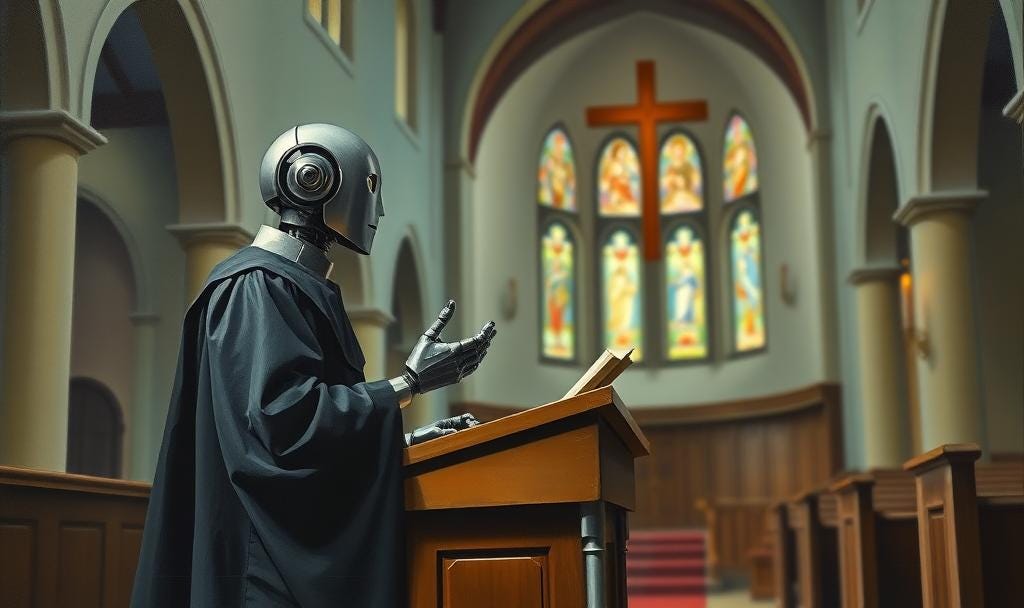There is a fascinating article in the journal Practical Theology by Swedish researchers on how some Swedish preachers are using AI in sermon preparation.
Mannerfelt, Frida, and Rikard Roitto. 2025. “Preaching with AI: An Exploration of Preachers’ Interaction with Large Language Models in Sermon Preparation.” Practical Theology 18 (2): 127–38.
This study explores how Swedish preachers incorporate AI chats such as ChatGPT into sermon preparation. Based on interviews, chat logs, and sermon manuscripts from six priests in the Church of Sweden, the study uses relevance theory to analyse the preachers' prompting and evaluation strategies. The preachers primarily use large language models (LLMs) for brainstorming and inspiration, critically evaluating the AI-generated responses, guided by their convictions, theological training and pastoral experience. Their prompting strategies reveal that many of them have a rudimentary understanding of how LLMs work. This leads them to underutilise its synthesising capacities and underspecify their homiletic context in their prompts. We argue that the preachers both underestimate and overestimate the LLM's communicative capacities, due to its humanlike style of communication.
I think most of us would agree that AI-generated sermons are a sin against God, nature, and your congregation (plus, the AI-generated sermons I’ve read are boring and banal). But is there a responsible and ethical way to use AI in sermon preparation?
First, I tell people not to be AI Luddites. AI is like a teaspoon. You can use a teaspoon to put sugar in your tea or to cook meth. It all comes down to how you use it.
Second, Christians have always embraced new technologies to spread the gospel and do the work of ministry, from the codex, to the printing press, to radio, to television, to the internet, and now AI.
Of course, when it comes to preaching, there are legit uses and obvious limits, because AI cannot apply a text to a local situation or speak into people’s specific lives. Plus, AI cannot deliver sermons with passion or persuasion (as far as I know).
The conclusion of the study was very interesting:
Contrary to the fears raised in public debates, none of the preachers blindly accept or copy AI-generated content into their sermons. Instead, they act as critical evaluators, using their theological training and pastoral experience to discern what ideas generated by the LLM are relevant to their context. However, the preachers often find the responses lacking in theological depth and rhetorical sophistication.
Our results underscore the continued importance of theological training in equipping preachers, also in the age of LLMs. Theological education needs to integrate learning about how LLMs can be used responsibly and effectively since future generations of preachers will likely see AI tools as another tool in their pastoral toolbox.
Let me know your thoughts in the poll below!



If a sermon is 100% AI-generated, then it's basically the same as copying someone else's sermon and preaching it.
But if you're using AI to ask questions about the text (like having a third person interacting with it), to identify blind spots, fix spelling mistakes, or even to find academic papers you can read on the topic—then I think it's fine.
The key is that people need to understand how AI works.
Did you know you can upload a Canva design and ask the AI to give you feedback on graphic design issues?
That's actually amazing—it can give you suggestions on padding, fonts, colors, and more.
I think those results are quite encouraging. Just like any technology AI can be misused but can also be a blessing if used wisely. It could be part of prayerful sermon preparation but not a substitute.
A friend of mine who is an Anglican clergyman was at an ordination service earlier this year and was uneasy with some of the prayers because when it came to confession of sin the prayers seemed to focus only on the horizontal, our relationships with other people, rather than on the vertical and the possibility that sin might be against God. He spoke to the bishop afterwards who admitted that the prayers had been AI generated.
I don't think generating prayers via AI is necessarily a bad thing but not to check them is.